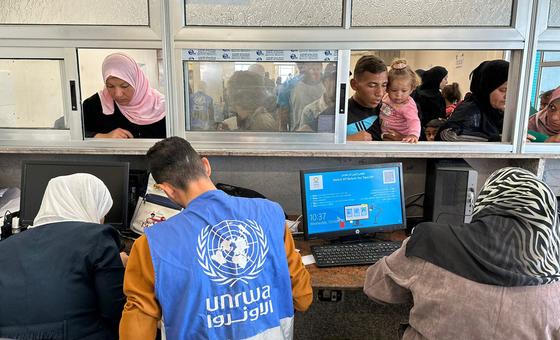
The Israeli Parliament, known as the Knesset, recently approved two laws banning UNRWA from operating in its territory and prohibiting officials from having any contact with the agency.
Israel has officially informed the President of the UN General Assembly of the adoption of the new legislation. The letter says all cooperation with the agency will cease after 90 days. Record low aidUNRWA Commissioner-General Philippe Lazzarini said on Monday that last month, Israel allowed a daily average of 30 humanitarian trucks into Gaza, which is only six per cent of the commercial and humanitarian supplies allowed in before the war.“This is the lowest in a long time, bringing the assistance back to the level of the beginning of the war,” he wrote on the social media platform X.“This cannot meet the needs of over two million people, many of whom are starving, sick and in desperate conditions.”A lifeline for millionsHe said that “meanwhile, UNRWA continues to distribute whatever is allowed in.”Staff have provided food aid to more than 1.9 million Gazans since the war erupted last October, while hundreds of thousands in and around its shelters have received basic supplies.The UN agency is also the largest primary healthcare provider in the enclave, and its teams have provided over six million medical consultations.Mr. Lazzarini stressed that much more aid must be allowed into Gaza, including through UNRWA, the largest humanitarian organization and service provider there.“Restricting humanitarian access and at the same time dismantling UNRWA will add an additional layer of suffering to already unspeakable suffering. Only political will can put an end to a politically made situation,” he said.
Children in Gaza play in a school converted into a shelter for families displaced by the conflict.
‘No alternative’ to UNRWAIn an earlier tweet, Mr. Lazzarini focused on how UNRWA also educates scores of young Palestinians.He said children and their education are not featured in discussions by “experts” or politicians as debate intensifies on replacing the agency.“Why? Because in the absence of a functioning State, there is no alternative,” he said.Until last October, over 300,000 boys and girls in Gaza – half of all schoolchildren there – attended UNRWA schools, and they are now losing out on a second year of studies.Nearly 50,000 children in the West Bank also go to UNRWA schools.Potential dire consequencesMr. Lazzarini explained that UNRWA is the only UN agency that directly provides education in UN schools. The agency runs the only system in the region that includes a human rights programme following UN standards and values.“Dismantling UNRWA in the absence of a viable alternative will deprive Palestinian children of learning in the foreseeable future,” he said.“Without learning, children slip into hopelessness, poverty and radicalization. Without learning, children fall prey into exploitation including joining armed groups. Without learning, this region will remain unstable and volatile,” he warned.He said that instead of focusing on banning UNRWA or finding alternatives, attention should be on reaching an agreement to end the conflict.Deadly weekend for childrenIn the interim, the fighting continues to exact a heavy toll on young lives across the Gaza Strip.UN Children’s Fund, UNICEF, said on Saturday that more than 50 boys and girls were killed in strikes in Jabalya, North Gaza, over the previous two days.The personal vehicle of one of its staff members working on the mass campaign to vaccinate young children against polio also came under fire while she was driving, causing damage.Additionally, at least three children were reportedly injured by another attack in the proximity of a vaccination clinic in Sheikh Radwan, while a polio vaccination campaign was underway.Risks in the northUNICEF chief Catherine Russell said these attacks are yet further examples of the grave consequences of the indiscriminate strikes on civilians in Gaza.“Attacks on civilians, including humanitarian workers, and what remains of Gaza’s civilian facilities and infrastructure must stop,” she said. Moreover, she warned that “the entire Palestinian population in North Gaza, especially children, is at imminent risk of dying from disease, famine, and the ongoing bombardments.”

